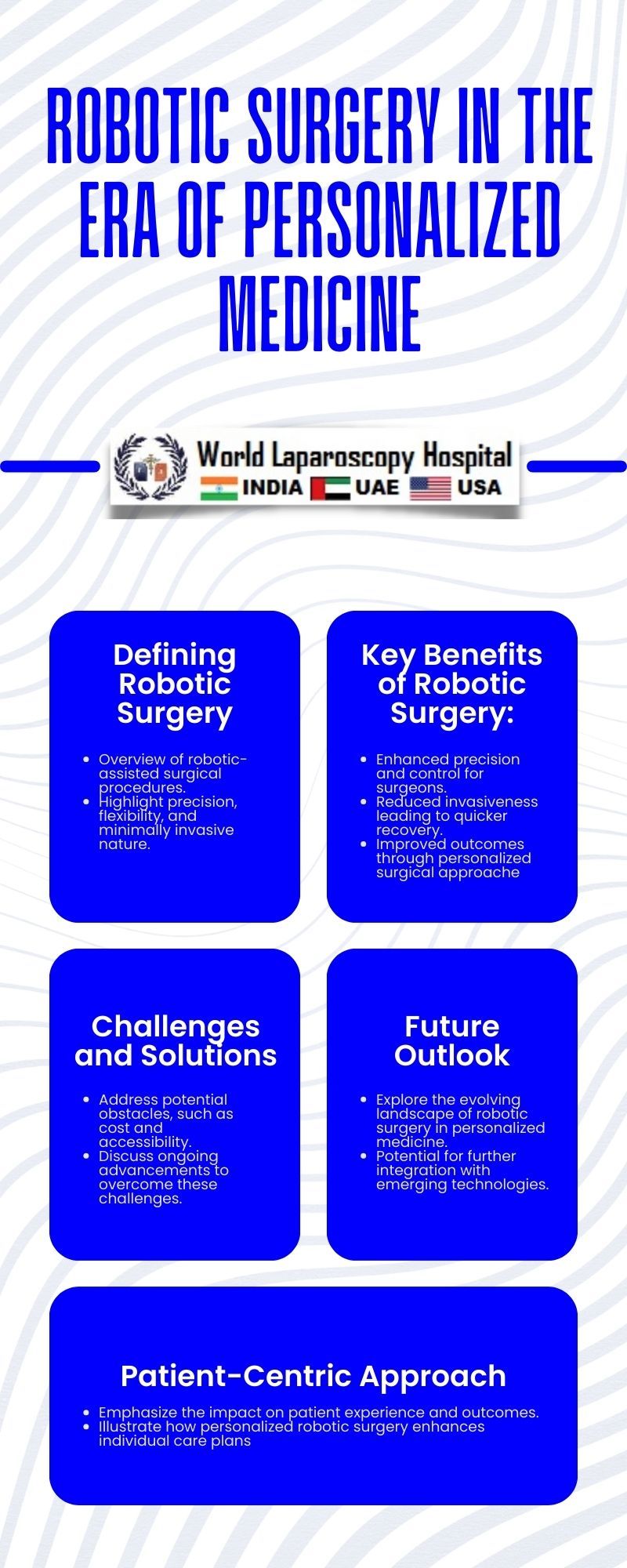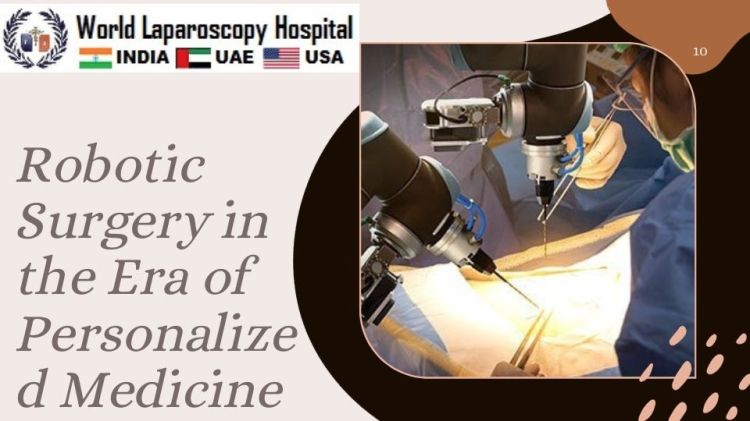Robotic Surgery in the Era of Personalized Medicine
Introduction:
The rapid advancement of technology has left an indelible mark on the field of medicine, with robotic surgery emerging as a revolutionary force in healthcare. This groundbreaking approach to surgery, coupled with the principles of personalized medicine, is reshaping the landscape of patient care. In this article, we will delve into the symbiotic relationship between robotic surgery and personalized medicine, exploring how these two frontiers are converging to provide more precise, effective, and individualized treatment options.

Robotic Surgery: A Leap into the Future
Robotic surgery represents a paradigm shift in the traditional approach to surgical procedures. Unlike conventional surgery, where the surgeon operates directly on the patient, robotic surgery involves the use of robotic systems controlled by surgeons. These systems, equipped with miniature instruments and high-definition cameras, offer enhanced dexterity, precision, and 3D visualization.
Precision and Dexterity:
Robotic surgical systems, such as the da Vinci Surgical System, provide unparalleled precision and dexterity. The robotic arms, controlled by the surgeon from a console, can make precise movements with a greater range of motion than the human hand. This allows for intricate procedures that were once deemed too challenging.
Minimally Invasive Techniques:
One of the key advantages of robotic surgery is its ability to perform minimally invasive procedures. Smaller incisions reduce trauma to the patient, leading to quicker recovery times, less postoperative pain, and reduced risk of infection. This aspect aligns with the overarching goal of personalized medicine - tailoring treatments to individual patients for better outcomes.
Personalized Medicine: Tailoring Treatment to the Individual
Personalized medicine, also known as precision medicine, is a healthcare approach that considers individual differences in patients' genes, environments, and lifestyles. The goal is to customize medical care to the unique characteristics of each patient, optimizing treatment effectiveness and minimizing adverse effects.
Genomic Medicine:
The advent of genomic medicine has been a cornerstone of personalized medicine. By analyzing a patient's genetic makeup, clinicians can identify genetic variations that may influence disease susceptibility, progression, and response to treatment. This information is invaluable in tailoring treatment plans, especially in the context of cancer therapy.
Targeted Therapies:
Personalized medicine has given rise to targeted therapies, which are designed to target specific molecules or pathways involved in the growth and survival of cancer cells. This precision approach minimizes damage to healthy cells, resulting in more effective treatment with fewer side effects. Integrating robotic surgery with targeted therapies can enhance the precision of treatment delivery.
Convergence of Robotic Surgery and Personalized Medicine
The synergy between robotic surgery and personalized medicine is transformative, as it combines the precision of robotic systems with the individualized approach of personalized medicine. This convergence is evident in various medical specialties, each showcasing how these technologies complement and amplify one another.
Oncology:
In the realm of cancer treatment, the integration of robotic surgery and personalized medicine is particularly pronounced. Robotic systems allow surgeons to perform intricate tumor removals with unparalleled precision. Concurrently, personalized medicine guides oncologists in selecting targeted therapies based on the genetic profile of the tumor, optimizing the chances of treatment success.
Cardiac Surgery:
Cardiac surgery, too, has witnessed remarkable advancements through the integration of robotics and personalized medicine. Robotic-assisted procedures for cardiac interventions offer a less invasive alternative to traditional open-heart surgery. Personalized medicine aids in identifying patients at higher risk for cardiovascular diseases, allowing for preemptive measures and tailored interventions.
Neurosurgery:
In neurosurgery, the precision afforded by robotic systems is indispensable. The ability to navigate through delicate neural structures with minimal invasiveness is a game-changer. Personalized medicine in neurosurgery involves understanding a patient's unique neural architecture, allowing for tailored approaches to conditions such as brain tumors or epilepsy.
Challenges and Ethical Considerations
While the integration of robotic surgery and personalized medicine holds immense promise, it is not without challenges and ethical considerations.
Cost and Accessibility:
The cost associated with robotic surgical systems can be prohibitive, limiting their accessibility in certain healthcare settings. Addressing this challenge is crucial to ensuring that these advanced technologies benefit a broader population.
Data Privacy and Security:
Personalized medicine relies heavily on the analysis of sensitive patient data, including genomic information. Ensuring robust data privacy and security measures is paramount to build and maintain trust in these technologies.
Ethical Use of Technology:
The ethical use of robotic surgery and personalized medicine requires careful consideration. Striking a balance between technological innovation and ethical principles is essential to prevent misuse and safeguard patient well-being.
Future Perspectives and Innovations
The future of healthcare lies at the intersection of robotic surgery and personalized medicine, with ongoing research and innovations poised to drive further advancements.
Artificial Intelligence Integration:
The integration of artificial intelligence (AI) into robotic surgical systems is a promising avenue. AI algorithms can enhance the decision-making process during surgery, providing real-time insights and augmenting the capabilities of surgeons.
Remote Surgery:
The concept of remote surgery, facilitated by robotic systems, is gaining traction. This could revolutionize healthcare delivery, allowing expert surgeons to perform procedures on patients located in remote or underserved areas.
Expanded Applications:
As technology continues to evolve, the applications of robotic surgery and personalized medicine are likely to expand. From orthopedic procedures to gastrointestinal surgeries, the possibilities are vast, providing tailored solutions for a myriad of medical conditions.
Conclusion:
The marriage of robotic surgery and personalized medicine heralds a new era in healthcare, where treatments are not only precise but also tailored to the unique characteristics of each patient. As these technologies continue to evolve and become more accessible, the landscape of medicine is undergoing a transformative shift. The journey towards a future where healthcare is truly personalized, precise, and patient-centric is well underway, driven by the convergence of robotic surgery and the principles of personalized medicine.



